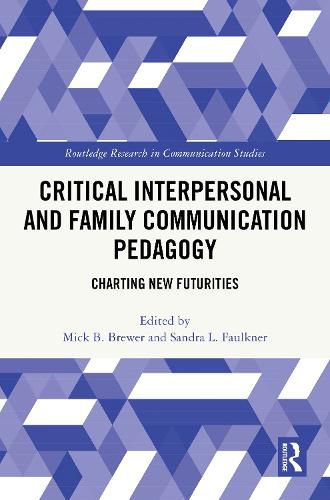Readings Newsletter
Become a Readings Member to make your shopping experience even easier.
Sign in or sign up for free!
You’re not far away from qualifying for FREE standard shipping within Australia
You’ve qualified for FREE standard shipping within Australia
The cart is loading…






This volume establishes critical interpersonal and family communication pedagogy (CIFCP) as a distinct academic area of inquiry, highlighting the intersections of identity, power, culture, pedagogy, and interpersonal and family communication concepts, theories, and methods.
This practical, theoretical, and aspirational collection by interpersonal and family communication (IPFC) scholars and teachers shines a spotlight on, through a diversity of methods, some of the ways that power both emanates within the classroom and informs intellectual instruction. Providing examples that connect critical theories and concepts with topics common in IPFC classrooms, such as conflict, relational tension, disclosure, listening, and family dynamics, the book illustrates how critical concepts can be uniquely addressed and unpacked in IPFC classrooms through a variety of assignments, teaching activities, and discussion prompts, and promotes and normalizes the ongoing reflexive practices of IPFC instructors.
This book will interest academics and upper-level students working in the areas of Critical Methodology, Interpersonal Communication, Family Communication, and Relationship Science.
$9.00 standard shipping within Australia
FREE standard shipping within Australia for orders over $100.00
Express & International shipping calculated at checkout
This volume establishes critical interpersonal and family communication pedagogy (CIFCP) as a distinct academic area of inquiry, highlighting the intersections of identity, power, culture, pedagogy, and interpersonal and family communication concepts, theories, and methods.
This practical, theoretical, and aspirational collection by interpersonal and family communication (IPFC) scholars and teachers shines a spotlight on, through a diversity of methods, some of the ways that power both emanates within the classroom and informs intellectual instruction. Providing examples that connect critical theories and concepts with topics common in IPFC classrooms, such as conflict, relational tension, disclosure, listening, and family dynamics, the book illustrates how critical concepts can be uniquely addressed and unpacked in IPFC classrooms through a variety of assignments, teaching activities, and discussion prompts, and promotes and normalizes the ongoing reflexive practices of IPFC instructors.
This book will interest academics and upper-level students working in the areas of Critical Methodology, Interpersonal Communication, Family Communication, and Relationship Science.